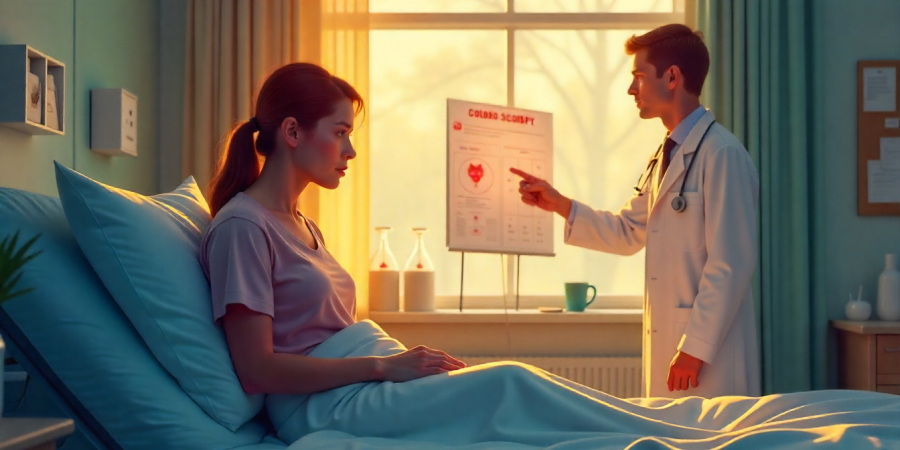
As a gastroenterologist, one of the most difficult conversations I have with patients is explaining that their colon cancer could have been prevented if they had come for screening earlier. These conversations happen more often than I’d like, and they’re entirely preventable.
The reality is stark: delaying your colonoscopy isn’t just postponing an uncomfortable procedure—it could literally be the difference between life and death.
The Silent Nature of Colon Cancer
Colon cancer is particularly dangerous because it develops slowly and silently. Most colon cancers begin as small, benign polyps that gradually transform over 10-15 years. During this long development period, there are typically no symptoms whatsoever.
By the time symptoms like rectal bleeding, abdominal pain, changes in bowel habits, or unexplained weight loss appear, the cancer has often already progressed to advanced stages. This is why screening is so critical—it catches the disease before you feel sick.
The statistics speak for themselves:
- Colon cancer is the third leading cause of cancer death in both men and women
- When detected early (Stage I), the 5-year survival rate is 92%
- When detected in advanced stages (Stage IV), the survival rate drops to just 11%
- Regular screening can prevent up to 90% of colon cancer deaths

Understanding the Screening Timeline
Current medical guidelines recommend that average-risk individuals begin colon cancer screening at age 45. However, if you have risk factors such as:
- Family history of colon cancer or polyps
- Personal history of inflammatory bowel disease
- Previous colon polyps
- Certain genetic syndromes
You may need to start screening earlier, sometimes as young as age 40 or even younger.
The Real Consequences of Delay
Every year of delay increases your risk. Here’s what the research shows:
- Polyps found in people who delay screening are more likely to be large and advanced
- Cancer detection rates are significantly higher in people who postpone recommended screening
- Treatment becomes more complex, invasive, and less successful with delayed detection
Common Reasons People Delay (And Why They’re Dangerous)
“I don’t have any symptoms.” This is exactly the point of screening. Colon cancer doesn’t announce itself early. Screening finds problems before you feel them.
“I’m too young/healthy.” Colon cancer rates are actually increasing in younger adults. Being healthy doesn’t make you immune—it makes early detection even more important for staying that way.
“I’m afraid of the procedure.” Modern colonoscopy is performed under conscious sedation. Most patients don’t remember the procedure and describe it as “easier than expected.”
“I don’t want to deal with the prep.” The bowel preparation has improved significantly. While not pleasant, it’s a small inconvenience compared to cancer treatment.
“I’ll do it next year.” Next year isn’t guaranteed, and cancer doesn’t wait for convenient timing.
What Actually Happens During a Colonoscopy
Let me demystify the process:
Preparation: You’ll follow a clear liquid diet the day before and take medication to clean out your colon.
The Procedure: You’ll receive sedation for comfort. Using a flexible scope, I examine your entire colon, looking for polyps or abnormalities. The procedure takes about 30 minutes.
Recovery: Most patients are ready to leave within an hour and can return to normal activities the next day.
Results: If polyps are found, they’re typically removed during the procedure, often preventing cancer from ever developing.
The Prevention Advantage
Here’s what makes colon cancer unique among cancers: it’s largely preventable. When we find and remove polyps during screening, we’re literally preventing cancer from developing. This isn’t true for most other cancers.
A colonoscopy doesn’t just detect cancer early—it prevents cancer entirely by removing precancerous polyps.
Risk Factors You Should Know
While screening is important for everyone, certain factors increase your risk:
- Age (risk increases after 45)
- Family history of colon cancer or polyps
- Personal history of inflammatory bowel disease
- Smoking and excessive alcohol consumption
- Diet high in red meat and processed foods
- Sedentary lifestyle
- Obesity

If you have multiple risk factors, don’t use them as an excuse to delay—use them as motivation to screen earlier and more frequently.
When to Stop Waiting
You should schedule your colonoscopy immediately if:
- You’re 45 or older and never been screened
- It’s been 10 years since your last normal colonoscopy
- You have any concerning symptoms (blood in stool, persistent abdominal pain, changes in bowel habits)
- You have a family history requiring earlier screening
- Your doctor has recommended it and you’ve been postponing
Making the Decision
As a gastroenterologist in Pretoria, I’ve seen the outcomes on both ends of the spectrum. I’ve seen patients whose lives were saved by routine screening that found early cancers or precancerous polyps. I’ve also seen patients whose delayed screening led to advanced cancer requiring extensive treatment.
The difference between these outcomes often comes down to timing. The patients who do well are those who don’t wait.
Your Next Step
If you’re reading this and thinking about your own screening timeline, don’t let another day pass. Colon cancer is one of the most preventable cancers, but only if you take advantage of screening.
The inconvenience of a colonoscopy lasts one day. The peace of mind lasts until your next screening. The potential life-saving benefits last forever.
Don’t gamble with your health. Schedule your colonoscopy today.
Dr. Preetha is committed to preventing colon cancer through education and early detection. If you’re due for screening or have questions about your risk, contact our office to schedule your consultation.
